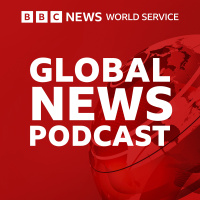Sinopsis
The daily drama of money and work from the BBC.
Episodios
-
Business Weekly
23/05/2020 Duración: 49minOn Business Weekly we be look at how our employers are going to keep us safe as we cautiously head out of lockdown and back into the workplace. But if our temperatures are taken and our movements recorded, how will they address that sensitive balance between safety and privacy? As soon as we’re back at work we might want a holiday - but will anywhere be open for tourists? We get the view from Spain the second most visited country on the planet. Plus, the food supply chain the the US is in crisis as a result of the Corona virus. We hear from farmers and unions who are worried for the future. And we find out why there’s a new boss at TikTok and hear from the managing director of a puzzle makers who tells us just why this old fashioned game is more popular than ever. Presented by Lucy Burton.
-
The future of movies after coronavirus
21/05/2020 Duración: 18minWith cinemas closed, will our lockdown streaming habits change the film industry for good? Manuela Saragosa speaks to cinema owner Penn Ketchum about the draw of the big screen, and plans to bring audiences back to theatres. Entertainment consultant Gene Del Vecchio explains why we should expect more films to find their way directly to our living rooms after coronavirus, bypassing cinemas all together. And TV and film producer Brian Udovich describes the shutdown in Hollywood, and the challenges of running a film set under social distancing rules.(Photo: Cinema popcorn, Credit: Getty Images)
-
Monitoring in the post lockdown office
20/05/2020 Duración: 17minHow much should employers know about their workers as people head back to the office? Companies have a duty of care to make sure their workers are safe, but how much monitoring is reasonable? Is this the end of privacy at work? Manuela Saragosa hears from Dutch privacy and employment lawyer Philip Nabben, as well as Sam Naficy the CEO of Prodoscore which makes software that monitors employee productivity, and Dr Tomas Chamorro-Premuzic, professor of business psychology at University College London.(Image: A security guard checks the temperature of an employee inside an office building in Shanghai. Credit: Getty Images).
-
Should we keep paying workers to stay at home?
19/05/2020 Duración: 17minGovernments are spending billions paying wages to workers who are no longer able to work due to the coronavirus pandemic. How long can we keep this up? Are we storing up problems by offering this type of unprecedented state-sponsored handout long-term?We hear from an employee in the tourism industry who has been furloughed, a hotel owner in the North of England who has had to furlough most of his staff, as well as Torsten Bell from the Resolution Foundation think tank who originally proposed the scheme in the UK before it was adopted, and Eamonn Butler from the free-market think tank the Adam Smith Institute who argues that the system is open to abuse.(Image: stock photo of a woman reading in the park. Credit: Getty Images.).
-
Venezuela: 'The world's weakest economy?'
18/05/2020 Duración: 17minA third of Venezuela's population is at risk of malnutrition, according to the UN and the latest gasoline crisis could weaken the country's economy further. Entire villages are said to have been cut off from food supplies because trucks can't get fuel to deliver to them. That’s the context a crisis which has made Venezuela the world’s weakest emerging economy, according to a recent review by the Economist magazine. Earlier this month the situation became even more volatile when two Americans were caught apparently trying to launch a coup attempt against the government. We hear from Adam Tooze, a professor of history at Columbia University and we get the views of Venezuelan opposition politician Manuela Bolivar. (Picture of a woman wearing a face mask walking next to graffiti reading Don't be a slave of the dollar in Caracas, photo by Federico Parra via Getty Images).
-
Business Weekly
16/05/2020 Duración: 49minHow do you feed a world in lockdown? We’ll be looking at the pressures on the global food supply chain in this episode of Business Weekly. As many choose to buy more locally produced food we’ll ask whether new habits will stick. Two renowned economists tell us that any governments handing out Coronavirus bailouts must learn the lessons from the financial crisis of 2008 and impose tighter conditions. ABBA’s Bjorn Ulvaeus speaks to us about life in Sweden during the pandemic and gives us his thoughts on fellow countrywoman Greta Thunberg. Plus - has the coronavirus forever changed the workplace as we know it? Lucy Burton presents.
-
Coal vs coronavirus
15/05/2020 Duración: 18minCoal has suffered the brunt of the huge slump in electricity demand as the world has gone into lockdown. It has highlighted the fossil fuel's Achilles Heel: When there is too much supply on the grid, it's coal-fired power stations that get switched off, not solar or wind.Justin Rowlatt speaks to the head of the International Energy Agency Fatih Birol, as well as analysts covering the two countries most central to coal's future. Delhi-based Sunil Dahiya says that India is already reckoning with renewable energy that is cheaper 24/7 than the cost of operating its existing coal fleet. Meanwhile Shirley Zhang of energy analysts Wood Mackenzie says that China's plans to build new coal-fired power stations is already baked in.Plus, Business Daily's favourite chemistry professor, Andrea Sella of University College London, explains why coal played such a central role in getting the Industrial Revolution started, with the help of an uncooperative steam engine.Producer: Laurence Knight(Picture: Cooling towers at the de
-
Billionaires and the Pandemic
14/05/2020 Duración: 17minSome of the world’s richest people have been digging deep during the pandemic, donating their own money to help fight Covid-19. With some of the wealthiest 1% already funding medical research, we ask how comfortable we should be with billionaires taking on an even bigger role in public health. Vivienne Nunis speaks to David Callahan, editor of the website Inside Philanthropy and Rob Reich, Professor of Political Science and co-director of the Center on Philanthropy and Civil Society at Stanford University. Chris Anderson, the head of the ideas-sharing platform, TED, tells us philanthropy needs a shake-up. And, neuroscientist Dr. Christof Koch explains what it’s like to work at a medical research institute funded by private money. (Picture: a charity savings jar. Credit: Getty)
-
Feeding a world in lockdown
14/05/2020 Duración: 17minLockdowns and the coronavirus pandemic have disrupted global food supply chains and limited the range of products on supermarket shelves in the rich world. Could new buying habits stick even after lockdowns end? Will less choice and seasonal produce become the 'new normal'? Manuela Saragosa talks to Guy Singh Watson of Riverford Organic Farmers in the UK, who welcomes the change in what's on offer, and Abdoul Wahab Barry of the International Fund for Agricultural Development in Cote D'Ivoire, who tells us what the disruption means for farmers in West Africa. And Professor Richard Wilding from Cranfield School of Management, a logistics and supply chain expert, gives us his take on what supply chains will look like in the future. (Image: Nearly empty pasta shelves in supermarket; Credit: Press Association)
-
How to build a bailout
11/05/2020 Duración: 17minCoronavirus is prompting the biggest government bailout effort of all time. Billions of dollars are being spent rescuing companies hit by the economic damage caused by the pandemic, but there are already criticisms that money is not going where it is most needed. In the US small and medium sized firms have been refused bailout loans, while larger firms have been borrowing millions; Ed Butler mulls the inequities in the system with Amanda Fischer of the Washington Center for Equitable Growth and Amanda Ballantyne of the Main Street Alliance. Eric de Montgolfier, Chief Executive of Invest Europe, an umbrella body representing private equity firms argues that all companies should be treated the same and Carys Roberts at the UK’s Institute of Public Policy Research suggests that certain criteria should be adopted by governments when they step in and that businesses themselves need to be responsible. (Image: UK Chancellor, Rishi Sunak, Credit: AFP Getty)
-
Business Weekly
09/05/2020 Duración: 49minOn Business Weekly we hear from New York chef Gabrielle Hamilton who’s lost her life's work to the pandemic and is worrying about her future and that of her staff. What help are governments giving to small businesses like hers? As New Zealand announces that it has no new cases of Covid-19 we find out how businesses are adapting to a new way of working as the country begins to lift lockdown restrictions. Advertising mogul Sir Martin Sorrell tells us about the effect the pandemic is having on his industry - and we’ll hear from the editor of a newspaper who tells us how he’s coping with a fall in advertising revenue.Plus, as parents struggle with working from home and looking after children, we find out what life is like for single parents at the moment.Presented by Lucy Burton.
-
Markets and the economy: Two staggering drunks
08/05/2020 Duración: 18minWhy are stock markets so buoyant as the global economy slides into a possible coronavirus-induced depression? Some 33 million Americans have lost their jobs in the past two months of the pandemic, yet the Nasdaq market is now higher than it was at the start of the year.The financial markets and the economy have been described as two staggering drunks tied together by a rope. Manuela Saragosa explores this odd analogy and how it applies to the current disconnect between share prices and jobless claims, with the help of Jane Foley, financial strategist at Rabobank.Meanwhile emerging markets are experiencing unprecedented financial outflows that risk undermining their ability to limit the damage Covid-19 does to their economies, according to Martin Castellano of the Institute of International Finance. Yet in the US, the Federal Reserve had no problem staving off financial calamity by promising to do whatever it takes, says Fed economist Julian Kozlowski.Producer: Laurence Knight(Photo: Drunken couple. Credit: Ge
-
Bringing back football
07/05/2020 Duración: 17minThe English Premier League's plans to finish the season after weeks of shutdown. Almost all major European football leagues have been on hold since March due to coronavirus. Ed Butler speaks to BBC Sports journalist Emlyn Begley about missing live football and his new love for the Belarusian league - the only place in Europe still staging matches. Football finance expert Kieran Maguire explains why failing to finish the season could cost the Premier League more than $1bn. And football club chairman Mark Palios says the current plan of playing matches behind closed doors is not an option for less wealthy clubs in lower leagues.(Photo: Anfield Stadium, home of Liverpool FC, after the shutdown of the league in March. Credit: Getty Images)
-
How coronavirus broke Brazil's economic dream
06/05/2020 Duración: 18minCould economy minister Paulo Guedes be the next key ally to abandon embattled President Bolsonaro?A corruption scandal has already seen the popular justice minister walk away. Meanwhile Bolsonaro fired his health minister as he seeks to reverse his own government's lockdown on the economy. With the official number of Covid 19 cases in the country surpassing 100,000, we hear the frustration of a doctor on the frontline.As for the economy minister, the BBC's South America business correspondent Daniel Gallas explains how this proponent of spending cuts and privatisation is coming to terms with a hugely expensive income support programme backed by Bolsonaro. Plus economist Monica de Bolle of the Peterson Institute explains why she fears that despite these measures, her country could be on the verge of a depression.Presenter: Manuela Saragosa Producer: Laurence Knight(Photo: People using protective masks wait in line outside a Caixa Economica Federal bank branch in Sao Goncalo, Brazil, to receive urgent g
-
After Coronavirus: A Trans-Tasman travel bubble?
05/05/2020 Duración: 18minNew Zealand is seen by many as a great example of surviving coronavirus, but with such a tourism-heavy economy there are concerns a further shock is to come. One idea mooted to help alleviate this is the so-called “trans-Tasman bubble” in which travel restrictions between Australia and New Zealand would be reciprocally lifted, before all the world’s borders open up, to stimulate commerce between the two nations. This programme features Colin Peacock in Wellington, Maggie Fea from Gibson Valley Wines in Queenstown, Veteran New Zealand politician Peter Dunne and Pacific health policy expert Dr. Colin Tukuitonga.(Picture: The Australia and New Zealand flags. Picture credit: Getty Images)
-
Losing your business to the pandemic
04/05/2020 Duración: 18minGabrielle Hamilton used to run the celebrated New York restaurant Prune. Then the coronavirus pandemic hit. After being forced to shut the place that was her life's work, she wonders if there will still be a place for it in the New York of the future.(Picture: Gabrielle Hamilton preparing food in the kitchen of her now closed restaurant Prune; Credit: Eric Wolfinger)
-
Welcome to Business Weekly
02/05/2020 Duración: 49minThe most compelling reports and interviews from the BBC's business programmes over the past week, examining the huge issues facing policymakers and asking what the future holds for our working lives. This week we ask a big moral question - will the deliberate shutting down of economies in an effort to slow Covid-19 kill more than the virus itself? Or as some have predicted will a recession actually save lives? We have a report from Brazil where conflicting messaging has sown confusion and fear. And we'll hear from small business owners, musicians and even horticulturalists. Presented by Lucy Burton.
-
Single parents in lockdown
01/05/2020 Duración: 17minLiving under lockdown is challenging for everyone, but for hundreds of millions of single parents around the world, it can be a terrifying ordeal. It’s not only emotionally draining, but can also be financially crippling, as Tamasin Ford has been finding out. She speaks to Sarah Cawley who delivers lunches to people who can’t leave their homes; she's from One Parent Family Scotland. We also hear from single mums, Fatia Islam in Paris and New Yorker, Thea Jaffe. Victoria Bensen, CEO of Gingerbread, the charity for single parent families in England and Wales talks about the mental and financial strain on single parents and Neferteri Plessy, founder of the charity Single Moms Planet paints a picture of lockdown in Santa Monica, in the US.Picture of Neferteri Plessy and one of her children, cr Neferteri Plessy.
-
The rise of contact tracing apps
30/04/2020 Duración: 18minGovernments around the world are planning to roll out contact tracing apps to help contain the spread of coronavirus. But will they work? Ed Butler speaks to BBC technology reporter Chris Fox about the technology that underpins them, and to researcher Natalie Pang from the National University of Singapore about the experience of Singapore's TraceTogether app, launched last month. But conventional human contact tracing has been around for decades. UK contact tracer Karen Buckley describes the challenges of the job, and John Welch from the non-profit Partners in Health describes his experience of contact tracing amid the Ebola outbreak in Africa and argues that apps are no substitute for an army of dedicated human contact tracers.(Photo: A man holds a smartphone showing a contact tracing app launched in Norway this month. Credit: Getty Images)
-
The ethics of pricing lives
29/04/2020 Duración: 17minIn today's Business Daily we're asking some awkward, often neglected questions - will the economic recession itself prove more fatal than coronavirus? How do and how should governments put a value on human life? To help answer these questions we speak to Bryce Wilkinson, a senior fellow at the New Zealand Initiative; US science journalist and biostatistician, Lynne Peeples and John Broome, a Professor of Moral Philosophy at Oxford University. (Picture of a wallet via Getty Images).














